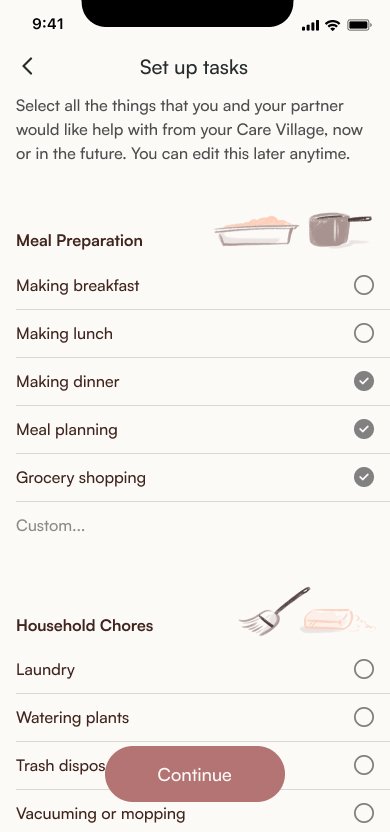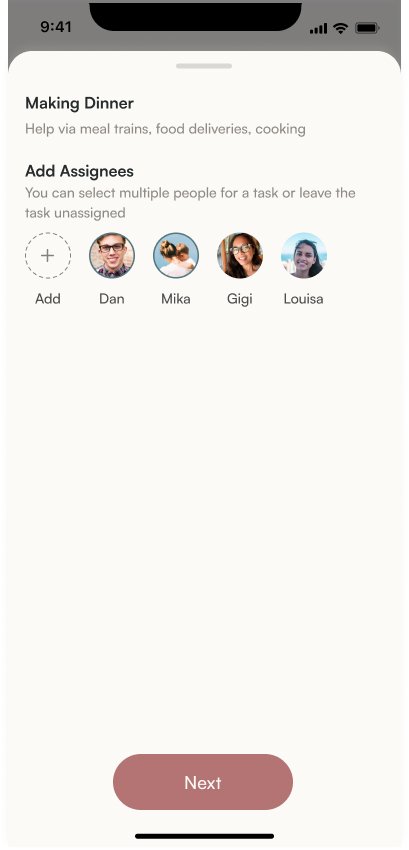
Mevi
Overview
Mevi is a task management app designed specifically for postpartum mothers. It aims to alleviate the challenges and stresses that come with postnatal responsibilities by facilitating the delegation of tasks to a mother's personal support network, or as known in Mevi, her village.
Mevi operates at the intersection of “FamTech” and FamTech industries. By acknowledging the importance of emotional support, the app tackles the cultural stigma surrounding help-seeking. It offers a platform where mothers can delegate tasks to their support networks, eliminating feelings of shame or awkwardness. By strengthening connections within these networks, Mevi aims to enhance maternal mental health and overall wellbeing during the postnatal period.
Role
As a freelance Designer for Mevi, my role was finalizing the interface and experience of the app. Coming onto Mevi, I faced the challenge of taking over a partially-designed, mostly lo-fidelity platform with no existing library or documentation. My first step was to conduct an audit of the existing interface to understand what had been accomplished and identify gaps in usability that needed attention.
Then, I focused on developing a cohesive and intuitive user experience, aligning my design elements with the partially completed designs. I created wireframes and interactive prototypes, refining them through A/B testing, usability testing and collaboration with my stakeholder.
Lastly, I created a library with design documentation, ensuring that the project would have a well-documented roadmap for future design and development reference.
Methods Used
Heuristics, Compatibility Testing, Feature Prioritization, User Flows, Wireframing, Prototyping, A/B Testing
Tools
Figma, Slack, Notion, Google Sheets, Zoom
Timeline
February 2024 — March 2024
Problem Space
All new mothers reside within a 30-mile radius of a friend or family member, yet societal pressures promoting independence and the ideal of women "having it all" have instilled a sense of shame in seeking assistance from these connections. Despite the innate desire for support, mothers find themselves uncertain about how to reach out for help.
Opportunities
Mevi's user-friendly interface allows mothers to create personalized task lists tailored to their specific needs and circumstances. By providing a neutral and non-judgmental space for task delegation, Mevi alleviates feelings of shame or uncertainty that mothers sometimes experience when asking for help. With clear instructions and guidance, Mevi empowers mothers to access support, streamlining communication and facilitating task delegation for a smoother postpartum experience.
Challenges
Timeline
The biggest constraint working on Mevi was the five week design deadline, which encompassed the assessment and implementation of five essential features. The condensed timeline necessitated a focused and disciplined approach to project management, with an emphasis on meeting weekly (sometimes daily) milestones and addressing any unforeseen obstacles promptly in order to achieve project success. While we were able to achieve our objectives, I would have valued additional time for testing.
Resource Constraints and Limited Budget
Resource constraints posed a significant challenge for Mevi, as the project budget was limited. Because of this, I sought out cost effective and free materials such as open-source icons through font awesome and royalty-free graphics to minimize expenses without compromising the quality of the interface. This required creative resourcefulness and meticulous research to identify suitable materials that aligned with the project and stakeholder’s vision.
Deciphering and Refining a Predecessor's Work
Without any documentation or insight into the original designer's intentions, I faced the challenging task of deciphering the existing work and doing my best to understand the app's underlying flows and structures. The lack of guidance made it difficult to grasp the rationale behind certain design choices. Additionally, navigating through incomplete flows required a lot of exploration and experimentation, which consumed valuable time and resources. This process demanded a high level of adaptability, creativity, and problem-solving skills. To support future designers and development efforts, I left notes, detailed documentation, and an organized design library.
Research
Task Analysis
Due to our tight deadline, task analysis was a critical part of the research process for Mevi. This analysis was key to understanding and refining the tasks that new mothers would need right away and would be most likely to use on the app. By dissecting each task—such as scheduling appointments, delegating tasks, and communicating with village members—into smaller, more manageable steps, we could quickly identify bottlenecks and prioritize essential functionalities.
A/B Testing
A/B testing was employed to fine-tune smaller elements of the user interface, such as button placement, colors, and text sizes, ensuring that the app was not only functional but also aesthetically pleasing and accessible.
Compatibility Testing
To ensure compatibility between the designs I inherited and my own, I conducted a thorough review and comparison process. This involved meticulously examining the existing designs left by the previous designer and aligning them with my own. I tested with users and my stakeholder to ensure consistency in style, layout, and functionality.
Continuous Feedback Loops
Throughout the project, feedback loops were established not just with users but also with stakeholders and cross-functional team members through tools like Slack and Zoom. These feedback loops ensured that everyone involved in the project was aligned and could contribute to the iterative design improvements.
Delivery
In our MVP, we aimed to deliver five key features: an onboard flow, TheyDo lists for setting up lists and tasks, TheyDo Lists for assigning tasks, a calendar view to display all tasks and their assignments, and a home page that prioritizes mothers’ mental wellbeing.
Onboard Flow — Welcome to Mevi
My stakeholder had a specific vision in mind for the onboard flow, aiming to introduce users to the app's features. While the text and onboarding as is now is effective in explaining Mevi's value, I believe adding interactive elements to show how to use the features would enhance the user experience and overall onboarding flow.
TheyDo Lists — Empowering Task Management
The "They Do List” empowers mothers by offering a curated selection of lists and tasks, enabling them to easily add responsibilities from predefined lists tailored to their needs and preferences.
Whether it's organizing childcare, scheduling medical appointments, or simply managing household chores, Mevi empowers mothers to reclaim precious time and focus on what truly matters — nurturing themselves and their newborn.
TheyDo Lists — Assigning Tasks
The task assignment feature acts as a central platform for mothers to distribute tasks among their village members, promoting community and shared accountability. Within this functionality, mothers have the flexibility to assign specific tasks from either predefined or custom lists. Additionally, mothers can assign tasks to multiple individuals at once, leave tasks unassigned for others to pick up, opt for private tasks shared only with selected village members, set tasks to repeat, specify task deadlines, and include custom notes for further clarity.
Calendar View
The calendar view provides mothers with a comprehensive overview of all tasks and their assigned members, offering a visual representation of upcoming responsibilities and fostering efficient planning and coordination within the community.
Home — Prioritizing Mother’s Mental Wellbeing
Mevi's homepage provides a supportive space where mothers feel comfortable acknowledging their needs without fear of judgment. Through gentle reminders, thoughtful prompts, and an AI messenger for inquiries, Mevi gently guides mothers towards prioritizing self-care and self-compassion, ultimately promoting emotional resilience and overall wellbeing.
Post-Release Expectations for Mevi
As Mevi continues through its funding phase, we are optimistic about the transformative potential it holds for new mothers. While the app is yet to launch, here are several outcomes we anticipate based on our development and user testing efforts:
Strengthened Social Connections
A key feature of Mevi is its ability to enhance and strengthen social connections. By facilitating easier communication and collaboration, we anticipate that mothers will feel more supported and less isolated. This social integration is designed to foster a strong sense of community, allowing mothers to feel more connected, not just to their immediate family but to a broader network of support.
Improved Maternal Mental Health
Mevi aims to directly contribute to improved maternal mental health by providing tools and resources that support emotional well-being. With features designed to encourage self-care and reduce feelings of isolation or inadequacy, we expect to see a notable positive impact on the mental health of mothers using the app. This includes less reported stress and a greater sense of control over their postnatal journey.
Adoption and User Engagement
We are working diligently to ensure that Mevi is as user-friendly and engaging as possible. Post-release, we expect high adoption rates among new mothers looking for a supportive tool to help manage their new responsibilities. Continued engagement will be driven by Mevi’s personalized features, such as customizable task lists and reminders that make the app not only useful but indispensable for daily planning and organization.
Feedback Loop and Continuous Improvement
After the launch, we plan to establish a robust feedback loop with our users. This will involve regular updates and feature enhancements based on direct user input, ensuring that Mevi continually evolves to meet the changing needs of its user base. This iterative process will help refine the app’s functionality and usability, cementing its place as a vital tool for mothers.
What’s next?
As my stakeholder for Mevi works on fundraising and testing, we already have ideas on ways to improve the app.
Mental Health Support: Resources for managing postpartum emotions, such as mood tracking, mindfulness exercises, and access to mental health professionals.
Partner and Family Support: Resources and tools for partners and family members to better understand and support moms during the postpartum period.
Health Tracking: Tools for tracking postpartum recovery progress, including physical health metrics like nutrition and exercise.
Results & Takeaways
Working on Mevi has been an incredibly rewarding experience. This app addresses a critical need — providing invaluable support to new moms, an area that often lacks sufficient resources. The development of Mevi was not just a fulfilling professional experience but also a heartfelt personal journey. It reinforced my belief in the power of community and how we can leverage UX to make a meaningful impact in the world. I am excited to see the positive changes Mevi will bring to its users and am proud to have been a part of its creation.










